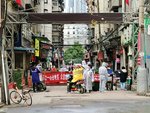



Editor’s note: University of Kentucky journalism professor Buck Ryan, who has traveled and taught widely in China, has been a visitor to and is familiar with Chatham County. He’s working on a case study of the News + Record and will visit Chatham again later in March. During his most recent visit to the newspaper earlier this year, he was accompanied by two Chinese students enrolled at Duke University. In this story, Ryan recounts recent exchanges with his friends in China, providing a unique perspective on surviving COVID-19 in China’s Hubei Province.
To learn what to know about COVID-19 and what it means for Chatham County, click here.
What does it take to survive a coronavirus outbreak?
If you ask the Centers for Disease Control and Prevention, you’ll get answers around preventative measures: wash your hands for 20 seconds, sneeze into your arm, stay home if you’re sick, and call a doctor if you have a fever, a cough and shortness of breath.
But if you ask another set of experts — people doing their best to live, work and care for their families at the epicenter of the crisis in China’s Hubei Province — you’ll get answers around matters of the mind and heart.
Start your preparation list with discipline and mental toughness.
“I’m trying to stay away from my phone,” said Lei Jiao, a Wuhan University graduate who teaches English at Wuhan University of Technology. “It’s so tragic here in Wuhan.”
That was how her WeChat message began a month ago, on Feb. 1. Jiao is collaborating with me on a novel, “The Kentucky-Fried Adventures of Maggie Lu,” designed to teach both English and cultural differences to Chinese students.
“To many this is the city of terror with people dying every day,” Jiao said later. “But I prefer to think, as the famous quote goes from Dr. Zhong, ‘Wuhan is a heroic city.’”
Dr. Zhong Nanshan is an epidemiologist dubbed the “SARS hero” by Chinese media for his honesty when he broke with the party line in 2003 to say that virus was “not all under control.”
Add to your preparation list a public spokesperson who commands trust.
WeChat is China’s most popular communications app. Wuhan, the capital of Hubei Province, is known as the “Chicago of China” with a population of 11 million.
Having spent most of my professional journalism career at the Chicago Tribune, I assure you the city bears no resemblance to Chicago, population 2.7 million, except maybe for the mighty river and commerce that run through it.
Wuhan University is one of the most prestigious and selective universities in China (think University of Chicago). It may be the most beautiful college campus I have ever seen.
Jiao has a daughter, Ruby, whose middle school is closed to protect against the spread of the virus. Ruby spends endless hours behind a home computer completing her lessons and homework as all instruction has gone online.
They have a yellow Labrador retriever, Dora, who gets her walks inside their quarantined apartment from the front door to the balcony, back and forth. The coronavirus couldn’t cancel Dora’s first birthday celebration, but there was no chance they could go out for cake.
The next day, on 02-02-2020, I wished Jiao a Happy World Palindrome Day, an eight-digit sensation not seen since 11-11-1111, or 909 years ago.
“People planned to get married that day,” she said. “But the registry office announced it’ll be closed on that day.”
Add preparation for disappointment and heartbreak to the list.
I suggested that as consolation maybe those young lovers could play the numbers in a lottery.
“That’ll work in another 900 years,” she responded.
Add a heavy dose of good humor.
On Feb. 7, I sent Jiao a China Daily opinion article, “Something’s not right here folks,” written by Mario Cavolo, a Yonkers, New York, native whose family is from Italy and who has lived in China for the last 20 years.
It was sent to me on WeChat by Lea Walker, president of the U.S. Chinese Culture Center, based in Columbia, South Carolina.
“Yep, I read it two days ago,” Jiao responded.
The subtitle, “A look at USA 2009 H1N1 Virus compared to China 2020 Coronavirus,” softens the point: China is suffering not just from a virus, but from xenophobic attacks that shut down travel and commerce and smeared the Chinese people in a way that did not afflict America when it was the source of the swine flu.
According to the CDC website, from April 12, 2009, to April 10, 2010, the centers estimated 60.8 million cases of H1N1 with 274,304 hospitalizations and 12,469 deaths in the U.S. due to the virus. For this year’s flu season, the CDC estimates there have been 18,000 deaths so far in the U.S.
Add historical perspective to the preparation list.
As for news coverage and an outlet for citizens’ views, such as this newspaper’s editorial page, Jiao offers this advice:
“I think too much transparency can cause chaos and panic of the masses. But as is shown this time in China at the initial stage, too little can lead to distrust and the loss of credibility. The people’s backlash can be destructive. The balance is pretty tricky.”
On Feb. 8, quarantines and lockdowns dimmed celebration of the Lantern Festival, which traditionally marks the end of the Spring Festival holiday, when family members traditionally travel far and wide to come together for the new year’s celebration.
Many of those who traveled to their hometowns to celebrate the Year of the Rat, which began on Jan. 25, were forced to stay put.
On Feb. 14, Jiao reported, “Our valentines have already been postponed to International Women’s Day,” traditionally celebrated in China on March 8 as a combination of Valentine’s Day and Mother’s Day.
On Feb. 16, she said, “Almost everything here has come to a halt...every residence building in Wuhan has been quarantined.”
On Feb. 20 came the first big scare.
Jiao’s mother had stayed indoors for about 25 days until Feb. 20 when she started running a temperature of 99.5 degrees and suffering chest distress. No question in her mother’s mind, she got the virus!
Jiao was not convinced as her mother’s symptoms didn’t add up. Plus, people who went to the hospital contracted the coronavirus that they didn’t have originally.
“But she panicked, so we decided to take the risk,” Jiao said.
All the residence blocks were sealed. They needed to contact community officials and register at several departments, then someone sent a car, probably a volunteer’s own private car.
As Jiao’s mother made her way through checkpoints, she realized she had left her ID card a few miles away in another neighborhood.
To retrieve it for her, Jiao needed to get approval from the community supervisor, and after several phone calls, Jiao was allowed to get on the road. No traffic!
Finally, Jiao’s mother made it to the hospital and got her diagnosis: the common cold.
Add to the preparation list a healthy dose of skepticism and mindfulness, not panic.
More good news: Once outdoors, Jiao brought food for the cats who roam her college campus, making sure they weren’t staring down empty dumpsters. She was pleasantly surprised that other creature lovers beat her to the punch.
On Feb. 29, Jiao forwarded an inspirational video, “To the fighters!” by citizen journalist Jessica Liu from Shenzhen, a city of 12.5 million that links Hong Kong to the mainland and is nearly 700 miles to the south of Wuhan.
Liu, forced to stay home from her intercultural communications job, put her skills to work to deliver an emotional, patriotic speech for her fellow citizens to win the COVID-19 “war.”
Add to the preparation list a rallying cry to lift everyone’s spirits.
About 220 miles away from Wuhan in Hubei Province is the Three Gorges Dam, the world’s largest hydroelectric dam that impounds China’s most important river, the Yangtze.
China Three Gorges University, like the dam, is in the city of Yichang, population 4 million.
Professor Gean Xi, director of the university’s Department of International Relations and founder of the campus’s Peach Blossom Festival, sees the peach blossoms on the trees but no hope of a festival.
“Many people asked me if I will continue to host the festival this year,” Xi said. “I’m afraid that crowding people at this time will not be a good thing.”
Recheck the preparation list for disappointment.
Xi needs a special permit to go out for business, and when he does, the warning sign of fever is foremost on everyone’s mind.
“When people meet each other during this critical moment, the greetings firstly are to check the temperature,” Xi said. “People here in Yichang have been quarantined at home since Jan. 24. We are now in the second round of a 14-day quarantine campaign.”
Add to the list a germ-free food delivery system.
“There are now more than 500 international students in our university,” Xi said. “Everyday the students order what they need online. Then in the afternoon, people from the university canteen will send the food to the dorms.”
That’s food for thought for Chatham County with so many college students in the area.
Something else that connects our cultures, whether it be the pride of North Carolina or the grit of Wuhan, was best expressed by author Shannon L. Alder:
“Heroes are not made. They are born out of circumstances and rise to the occasion when their spirit can no longer coexist with the hypocrisy of injustice to others.”
On the threat of COVID-19, Jiao said, “We have indeed made great sacrifices to prevent it from spreading to other provinces and other countries by locking ourselves in for more than 40 days in a row and still at least a month to go.
“Community workers down my building deliver food every day, even in cold rain, and go door to door checking on residents, especially senior citizens.”
Let’s pray that the self-sacrifices of the brave people of Hubei Province lessened the chance of a coronavirus outbreak there or here.
If we’re not so lucky, at least we know it will take more than CDC guidelines to weather the storm.
Author’s Background
Buck Ryan, a journalism professor at the University of Kentucky, is working on a case study of the News + Record, which he views as a model of success for community newspapers here and abroad. In 2008 Ryan produced “Citizen Kentucky/Citizen China: Hope for a New Century,” a half-hour public television documentary exploring cultural connections between the U.S. and China as a preview to the Beijing Olympics. In 2010 he was the first UK journalism professor-in-residence at Shanghai University, launching teaching experiences at three other Chinese universities and an international high school in Hohhot, the capital of Inner Mongolia.
LINKS
• China Daily opinion article, “Something’s not right here folks”
http://www.chinadaily.com.cn/a/202002/08/WS5e3e7ff9a310128217275fcd.html?from=timeline&isappinstalled=0
• According to the CDC website, from April 12, 2009, to April 10, 2010, the centers estimated 60.8 million cases of H1N1
https://www.cdc.gov/flu/pandemic-resources/2009-h1n1-pandemic.html
• 2020 flu season, CDC estimates 18,000 deaths
https://www.cdc.gov/flu/weekly/index.htm
• Inspirational video, “To the fighters!” by citizen journalist Jessica Liu
https://news.cgtn.com/news/2020-02-29/We-are-all-fighters-OtZgK8lXLq/index.html

Ryan
Ryan